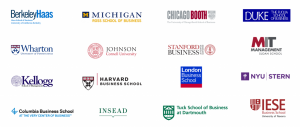
MBA programs have traditionally been the finishing school for ambitious students, who hand over $100,000 for a year or two of studies that promise to jump-start high-paying careers. That venerable formula is showing signs of strain, according to executive education consultants CarringtonCrisp in London.
The company surveyed 508 employers from 22 countries this year and found that 77% believe the MBA needs some form of makeover. Since the 2008 financial crisis, companies and B-schools have drifted apart, says Andrew Crisp, co-founder of CarringtonCrisp. The coronavirus pandemic has exacerbated the disparity by spurring shifts in the economy and the way we work. “There’s this mismatch between what employers are looking for and what many of the business schools are offering,” he says.
MBA programs focus heavily on corporate finance. Employers want grads to also be able to handle strategic projects such as broad-scale digital transformation, according to the consultancy, which published the survey results in July. Many respondents said the MBA degree must evolve to be relevant for the future, and they were interested in changes to the delivery of education, including co-creation of content with B-schools; approaches to taking a degree that don’t involve full-time study; and short, inexpensive, and flexible programs that deliver appropriate skills for employees and meet the requirements of lifelong learning.
Business schools are trying to respond to the evolving needs of employers, and many have made inroads in teaching hot topics like sustainability and diversity and inclusion, though much of that education is bolt-on courses, rather than core to their programs, says Mary Francia, a partner at recruiter Odgers Berndtson. She pointed to the Center for Sustainable Global Enterprise at Cornell University’s SC Johnson College of Business as a model to emulate. Many graduates are well-grounded in core competencies, but companies are now looking for emotionally intelligent executives, she says. “What they don’t bring a lot of is that understanding that social skills are important and you need to engage employees,” Francia says.
Still, employers should expect to do some of the education of their new employees, particularly with regard to digital tools such as Slack and BaseCamp, which can be taught during onboarding processes, says Bernt Blankholm, chief executive officer of Highered, a consulting firm in Norway that’s a global strategic partner of EFMD Global, a coalition of business schools and companies focused on management development. The MBA’s core skills are still important, he says, and the rest can be learned elsewhere. “Students need new digital skills that aren’t really taught in schools,” Blankholm says.
Part of the challenge for B-schools is to move beyond the “generic” and broad nature of the traditional MBA program, says Cary Cooper, professor of organizational psychology at Alliance Manchester Business School and past president of the Chartered Institute of Personnel and Development, a human resources industry group in London. “It covers everything you need to know but doesn’t specialize you into anything,” he says.








